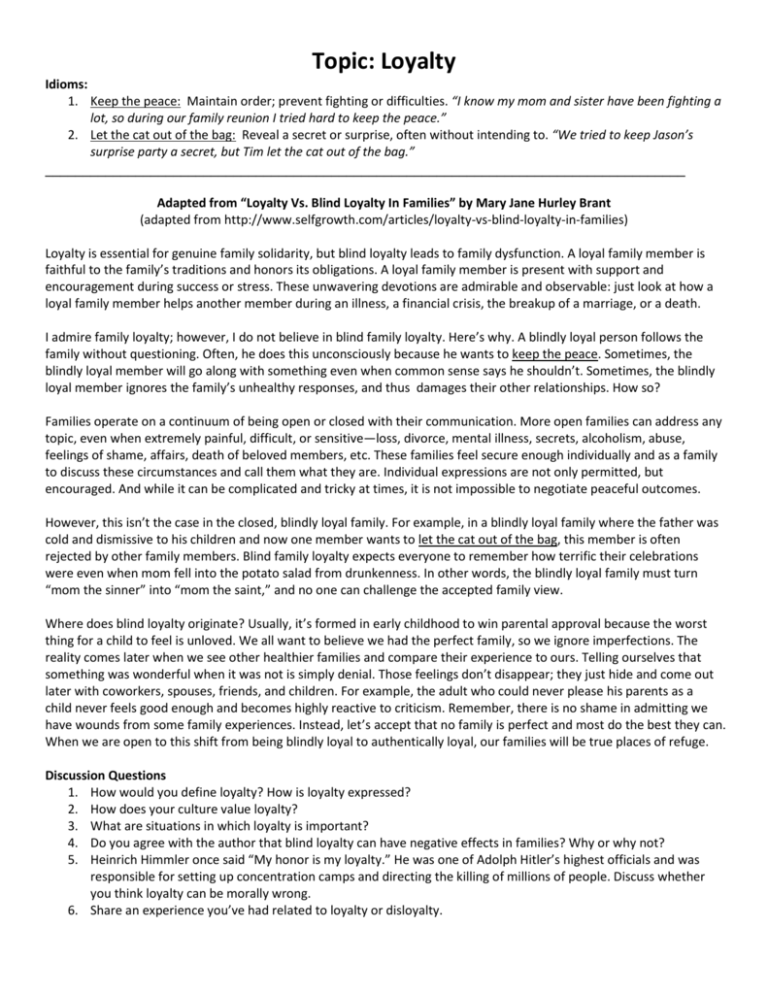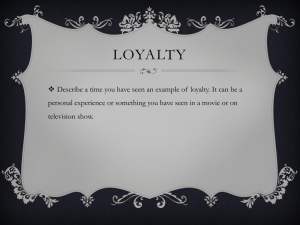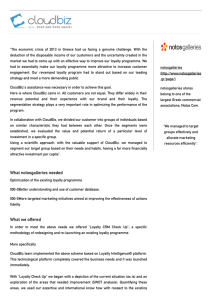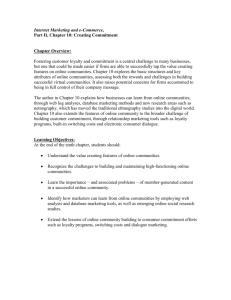Loyalty Conversation Topic - NYC International Project
advertisement

Topic: Loyalty Idioms: 1. Keep the peace: Maintain order; prevent fighting or difficulties. “I know my mom and sister have been fighting a lot, so during our family reunion I tried hard to keep the peace.” 2. Let the cat out of the bag: Reveal a secret or surprise, often without intending to. “We tried to keep Jason’s surprise party a secret, but Tim let the cat out of the bag.” _____________________________________________________________________________________ Adapted from “Loyalty Vs. Blind Loyalty In Families” by Mary Jane Hurley Brant (adapted from http://www.selfgrowth.com/articles/loyalty-vs-blind-loyalty-in-families) Loyalty is essential for genuine family solidarity, but blind loyalty leads to family dysfunction. A loyal family member is faithful to the family’s traditions and honors its obligations. A loyal family member is present with support and encouragement during success or stress. These unwavering devotions are admirable and observable: just look at how a loyal family member helps another member during an illness, a financial crisis, the breakup of a marriage, or a death. I admire family loyalty; however, I do not believe in blind family loyalty. Here’s why. A blindly loyal person follows the family without questioning. Often, he does this unconsciously because he wants to keep the peace. Sometimes, the blindly loyal member will go along with something even when common sense says he shouldn’t. Sometimes, the blindly loyal member ignores the family’s unhealthy responses, and thus damages their other relationships. How so? Families operate on a continuum of being open or closed with their communication. More open families can address any topic, even when extremely painful, difficult, or sensitive—loss, divorce, mental illness, secrets, alcoholism, abuse, feelings of shame, affairs, death of beloved members, etc. These families feel secure enough individually and as a family to discuss these circumstances and call them what they are. Individual expressions are not only permitted, but encouraged. And while it can be complicated and tricky at times, it is not impossible to negotiate peaceful outcomes. However, this isn’t the case in the closed, blindly loyal family. For example, in a blindly loyal family where the father was cold and dismissive to his children and now one member wants to let the cat out of the bag, this member is often rejected by other family members. Blind family loyalty expects everyone to remember how terrific their celebrations were even when mom fell into the potato salad from drunkenness. In other words, the blindly loyal family must turn “mom the sinner” into “mom the saint,” and no one can challenge the accepted family view. Where does blind loyalty originate? Usually, it’s formed in early childhood to win parental approval because the worst thing for a child to feel is unloved. We all want to believe we had the perfect family, so we ignore imperfections. The reality comes later when we see other healthier families and compare their experience to ours. Telling ourselves that something was wonderful when it was not is simply denial. Those feelings don’t disappear; they just hide and come out later with coworkers, spouses, friends, and children. For example, the adult who could never please his parents as a child never feels good enough and becomes highly reactive to criticism. Remember, there is no shame in admitting we have wounds from some family experiences. Instead, let’s accept that no family is perfect and most do the best they can. When we are open to this shift from being blindly loyal to authentically loyal, our families will be true places of refuge. Discussion Questions 1. How would you define loyalty? How is loyalty expressed? 2. How does your culture value loyalty? 3. What are situations in which loyalty is important? 4. Do you agree with the author that blind loyalty can have negative effects in families? Why or why not? 5. Heinrich Himmler once said “My honor is my loyalty.” He was one of Adolph Hitler’s highest officials and was responsible for setting up concentration camps and directing the killing of millions of people. Discuss whether you think loyalty can be morally wrong. 6. Share an experience you’ve had related to loyalty or disloyalty. Quotations “It is better to be faithful than famous.” – Theodore Roosevelt “Loyalty to the country always. Loyalty to the government when it deserves it.” – Mark Twain “The only way to have a friend is to be one.” – Ralph Waldo Emerson “Let love and faithfulness never leave you; then you will win favor and a good name in the sight of God and man.” – The Bible (Proverbs 3:3-4)








